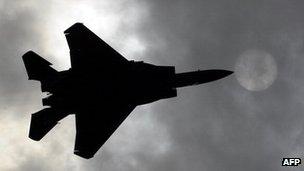US sells $30bn in F-15 jets to Saudi Arabia
- Published

The sale of the F-15s is part of a 2010 deal voted on by the US Congress
The United States has confirmed the sale of nearly $30bn (£19.5bn) of fighter jets to Saudi Arabia.
The US will send 84 Boeing F-15 jets to its key Middle Eastern ally, and upgrade 70 existing Saudi F-15s.
The agreement is part of a $60bn arms deal covering 10-15 years, approved by the US Congress last year.
The military hardware deal comes at a time when Washington is working to counter the influence of the Saudis' bitter regional rival, Iran.
The sale was formally announced on Thursday from Hawaii, where President Barack Obama is on holiday.
'Strong message'
In Honolulu, White House deputy spokesman Josh Earnest said the deal would support more than 50,000 American jobs at a time of high unemployment.
In Washington, senior state department official Andrew Shapiro said it would send "a strong message to countries in the region that the United States is committed to stability in the Gulf and broader Middle East".
"It will enhance Saudi Arabia's ability to deter and defend against external threats to its sovereignty," he added.
As well as the F-15s, the larger $60bn package includes Apache attack helicopters, Black Hawk helicopters, and a range of missiles, bombs and delivery systems.
The plan initially raised concerns from pro-Israeli members of Congress, but US officials reassured them that Israel's regional military edge would not be undercut by the sale.
The announcement comes in a week when Tehran said it might close the Strait of Hormuz if the country was hit by more sanctions, prompting the US to warn it would not tolerate any disruption of the vital oil route.
Tensions between the Saudis and the Iranians were heightened after the US accused Tehran of plotting to assassinate the Saudi ambassador to Washington earlier this year.
Saudi Arabia, as well as being a main plank of American policy in the Middle East, is also vital to US energy security, ranking as the third-largest source of its oil imports.
- Published14 September 2010